| Srl | Item |
| 1 |
ID:
115219
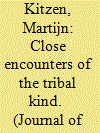

|
|
|
|
|
| Publication |
2012.
|
| Summary/Abstract |
In contemporary counter-insurgency campaigns de-escalation is typically achieved by obtaining the local population's collaboration. The rationale underlying this approach is that such collaboration spawns control over the population and therefore weakens the insurgent's position. This article seeks to understand how this approach is practised in the reality of contemporary counter-insurgency warfare. In Iraq as well as Afghanistan counter-insurgents were confronted with fragmented indigenous societies in which the various local segments were dominated by local power-holders. Consequently, obtaining the local population's collaboration required co-option of these agents. As such a strategy of co-option is a highly localized approach, this article focuses on Afghanistan's Uruzgan province and analyzes the implementation of co-option by the Netherlands' Task Force Uruzgan (TFU), which operated there from 2006 to 2010. The analysis discusses how the counter-insurgents obtained a profound understanding of Uruzgan's societal landscape and how co-option of local power-holders became part of the counter-insurgency routine. In the end, co-option was successfully implemented as TFU even succeeded in obtaining the collaboration of previously marginalized elements of the population. However, as the methods employed for co-option were mainly of a persuasive nature, the TFU co-option strategy was less effective in containing the influence of notorious spoilers. Thus this case study provides an insight into the dynamics and limitations of co-option as a tool for de-escalation in contemporary counter-insurgency warfare.
|
|
|
|
|
|
|
|
|
|
|
|
|
|
|
|
| 2 |
ID:
115218
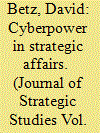

|
|
|
|
|
| Publication |
2012.
|
| Summary/Abstract |
This article explores the effect of connectivity on strategic affairs. It argues that the effect on war's character is potentially, although not yet shown in practice, considerably large. Its effect upon the distribution of power among states in the international system is small, contrary to the claims of `cyberwar' alarmists. All told, however, its effect upon strategic affairs is complex. On the one hand, it represents a significant advance in the `complexification' of state strategies, understood in the sense of the production of intended effects. On the other hand, strategists today - still predominantly concerned with the conflicts and confrontations of states and organised military power - are generally missing the power which non-traditional strategic actors, better adapted to the network flows of the information age, are beginning to deploy. These new forms of organization and coercion will challenge the status quo.
|
|
|
|
|
|
|
|
|
|
|
|
|
|
|
|
| 3 |
ID:
115220
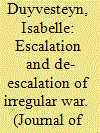

|
|
|
|
|
| Publication |
2012.
|
| Summary/Abstract |
The final contribution brings together the main findings of the individual articles, draws conclusions and formulates future research challenges in regards to understanding the escalation and de-escalation of irregular war.
|
|
|
|
|
|
|
|
|
|
|
|
|
|
|
|
| 4 |
ID:
115214
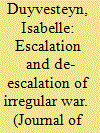

|
|
|
|
|
| Publication |
2012.
|
| Summary/Abstract |
The introduction sets out the theme of the special issue. It introduces the topic of escalation by discussing the current state of the art in the literature and it outlines the set up of the remainder of the issue.
|
|
|
|
|
|
|
|
|
|
|
|
|
|
|
|
| 5 |
ID:
115216
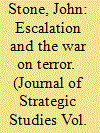

|
|
|
|
|
| Publication |
2012.
|
| Summary/Abstract |
This article makes a case for treating escalation in irregular warfare as different in kind from the regular variant that was originally theorized during the Cold War. The regular variant emphasizes the role of clearly defined and commonly recognized `thresholds' as a means of organizing cooperation within conflict. In contrast, the irregular variant can reward efforts by weaker terroristic actors to erode the moral significance of the combatant/non-combatant threshold, just as it can reward efforts by their stronger adversaries to bolster it.
|
|
|
|
|
|
|
|
|
|
|
|
|
|
|
|
| 6 |
ID:
115215
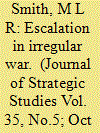

|
|
|
|
|
| Publication |
2012.
|
| Summary/Abstract |
If all violence is intended to achieve political effects, what is distinctive about escalation in irregular war? Indeed, what is irregular war? To answer such fundamental questions this analysis employs the principles of strategic theory in an attempt to offer a theoretical and practical framework that will facilitate an appreciation of the subsequent contributions to this special issue. The assessment seeks to articulate how the escalation process in conditions of so-called irregular war might be conceptualized and, via examples, illustrate how certain broad observations may be held to be true. Ultimately, though, the argument emphasizes that the process of escalation cannot be distinctive or follow predictable patterns given that all wars are unique to their time and place and will be affected in their conduct by the contingent forces of passion, chance and reason.
|
|
|
|
|
|
|
|
|
|
|
|
|
|
|
|
| 7 |
ID:
115217
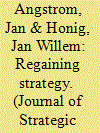

|
|
|
|
|
| Publication |
2012.
|
| Summary/Abstract |
In Western operations in Afghanistan, small European powers escalate in different ways. While Denmark and the Netherlands have contributed to Western escalation through integration with British and US forces, Norway and Sweden have done so by creating a division of labour allowing US and British combat forces to concentrate their efforts in the south. These variations in strategic behaviour suggest that the strategic choice of small powers is more diversified than usually assumed. We argue that strategic culture can explain the variation in strategic behaviour of the small allies in Afghanistan. In particular, Dutch and Danish internationalism have reconciled the use of force in the national and international domains, while in Sweden and Norway there is still a sharp distinction between national interest and humanitarianism.
|
|
|
|
|
|
|
|
|
|
|
|
|
|
|
|